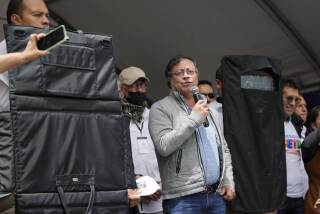Election Rally Watchers Requested : Nicaragua: Opposition candidate Chamorro asks for outside observers after a campaign clash kills one and injures 13.
- Share via
SAN JOSE, Costa Rica — Nicaragua’s opposition presidential candidate, Violeta Barrios de Chamorro, asked Central America’s presidents Monday to send emissaries to monitor her campaign rallies, after a violent clash between her supporters and Sandinistas left one dead and at least 13 wounded.
A battle with stones, machetes and guns broke out Sunday at a United Nicaraguan Opposition (UNO) rally in Masatepe, 30 miles southwest of the Nicaraguan capital of Managua. The ruling Sandinista party headquarters, a house and car were burned in the fray.
Each side blames the other for instigating the violence that resulted in the first fatality in the presidential campaign.
The political leanings of the victim, Manuel Guevara Calero, were not immediately known. There were wounded on both sides.
Chamorro’s campaign manager, Antonio Lacayo, made the appeal for observers as the five Central American presidents convened for a second day of regional peace talks in Coronado, a suburb of this capital.
“The Sandinista Front has launched a campaign of physical violence against our rallies,” Lacayo charged, speaking to reporters. “The real picture is that (the elections) are seriously threatened by these continuous provocations that UNO people are subjected to by militants, sympathizers and people following the instructions of the Sandinista Front.”
For their part, the Sandinistas blame UNO for instigating the violence, and observers issued contradictory assessments.
Organization of American States observers issued a five-page report on the confrontation, saying that “the violent acts began abruptly and it was impossible to say who initiated . . . them.”
An American delegation led by the Center for Democracy, a conservative Washington-based foundation, observed the fracas in Masatepe and flew to Costa Rica to denounce the confrontation as a Sandinista attack.
Robert Beckel, a member of the delegation, said he was caught between the two sides at the rally and knocked to the ground.
“What I witnessed was supporters of the Sandinistas taking machetes and directly attacking supporters of UNO,” Beckel said.
“I went in (to Nicaragua) with the view that there would be an impartial and fair election. . . . But unless events change I cannot believe . . . that a fair and impartial election can take place in that country with the kind of intimidation I saw take place by the Sandinistas,” he said.
The election is scheduled Feb. 25, with observers from the United Nations and the Organization of American States. Former President Jimmy Carter and hundreds of other private observers from the United States and Europe are also slated to be on hand for the vote.
Chamorro, widow of a murdered newspaper editor, is running against President Daniel Ortega of the Sandinista Front and an array of minor party candidates. The United States has supported Chamorro’s campaign financially.
Ortega’s spokesman, Manuel Espinoza, denounced the accounts by the Americans as “intervention” and part of a smear campaign.
“They come here to try to discredit what authorized observers have been saying,” Espinoza said. “UNO is responsible for provoking the violence.”
A government bulletin said that 13 people were arrested after the incident. It was not immediately known if they were Sandinistas or opposition supporters.
Both sides pressed their version of the event while the five Central American presidents met behind closed doors, seeking ways to end a decade-old civil war in El Salvador and to demobilize the U.S.-backed Contras fighting Nicaragua’s Sandinistas.
The presidents talked for nearly 12 hours Sunday and resumed work Monday.
Negotiations continued late into Monday night. At one point, President Jose Azcona Hoyo of Honduras stormed out of the meeting after a dispute with Nicaraguan leader Ortega over the issue of a World Court case that Nicaragua is pressing against Honduras for letting the Contras operate from Honduran territory.
A diplomatic spokesman for Costa Rica, the host to the conference, said he did not know if Azcona would return to the table.
The summit is an attempt to rescue a Central American peace plan that was signed by the presidents in August, 1987.
El Salvador has suspended diplomatic relations with Nicaragua over reported Sandinista arms shipments to the Salvadoran leftist guerrillas. The Sandinistas, meanwhile, revived their suit against Honduras for failing to disband the Contras and evict them from Honduras by Dec. 5 as they had agreed to do under the peace plan.
Ortega ended a 19-month cease-fire last month after a series of Contra military raids, and just weeks later the Farabundo Marti National Liberation Front launched its biggest offensive of the war in El Salvador.
Among the proposals on the table were a request from Arias for a Christmas truce in El Salvador and for increased U.S. and Soviet involvement in the peace process.
More to Read
Sign up for Essential California
The most important California stories and recommendations in your inbox every morning.
You may occasionally receive promotional content from the Los Angeles Times.













